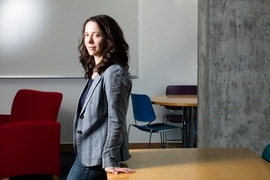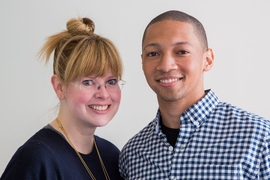Marion Boulicault hates making decisions. “I want to do everything,” she says, “and one of the effects of making a choice is that other choices are closed off.” Alternately drawn to work in environmental science, public policy, and philosophy, she has always felt compelled to bring her interests together.
So when she first began her doctorate in philosophy at MIT, Boulicault assumed that choosing such an abstract field meant letting go of the pragmatic, on-the-ground impact of a career in public service.
But after taking STS.260 (Introduction to Science, Technology, and Society), a class that analyzes science as a human activity, she found the two didn’t have to be mutually exclusive. She petitioned her department to allow her to take courses in the Program in History, Anthropology, and Science, Technology, and Society (HASTS) for credit, and has been dismantling disciplinary boundaries ever since.
Working at the interface of philosophy and science
Through her HASTS interdisciplinary coursework, Boulicault first encountered a field that intrigued her: the feminist philosophy of science. She was struck that problems of gender in science go far beyond equal representation. “The notion of ‘bias’ can’t be understood only at an individual level — it’s also social, cultural, and structural. Although science is often idealized as value-free and purely ‘objective,’ it’s a practice done by people and institutions,” she says. “Science is inherently social.”
A seminal study in her field, and a favorite of Boulicault’s, is detailed in Emily Martin’s “The Egg and the Sperm.” The 1991 study deconstructs the language of scientific textbooks, arguing that descriptions of the egg and sperm fit a gendered, fairy-tale paradigm: The egg is characterized as a passive damsel in distress, waiting to be awakened, and the sperm are described as energetic and active, in unwavering pursuit of fertilization. This paradigm hindered scientific progress, Martin writes, because it delayed crucial research characterizing the egg’s active role recruiting the sperm and the dynamic relationship between the sex cells.
Boulicault’s research extends this idea to the most fundamental language of science: numbers, metrics, and measurements. She is currently analyzing the use of metrics in fertility research, particularly the differences between two common infertility tests: the ovarian reserve test, and standard semen analysis. Boulicault’s work asks if and how social ideas about gender play a role in fertility measurements, and what this might mean for scientific research into fertility.
“The metaphor of women’s ticking biological clocks, and the narrative of an ovarian reserve that is constantly being depleted … these are central frames for the way we measure and think about fertility,” Boulicault says. “I worry that these frames might be entangled with potentially problematic ideas and norms about the role of women in society, and that these frames might end up hindering our understanding of how fertility actually functions.”
She adds: “What I’m investigating is: If we ask different questions and approach fertility research with different frameworks and measurements, might we find new or surprising things about the phenomenon of human fertility?”
Creating her community
Originally from London, Boulicault still feels homesick at times. She didn’t expect moving to the U.S. to be the culture shock that it was; even the differences in the English language gave her pause. “The tone and the cadence and cultural structures [aren’t the same]. There are other differences that are hard to articulate. Feeling like you fit in happens in feeling-y ways,” she says.
One way in which Boulicault has found a home away from home is through co-op living. In shared houses that emphasize collective living and decision-making, residents build a strong sense of community through weekly dinners and group house project days, and by prioritizing open communication. Boulicault also feels at home in nature; she enjoys hiking in the nearby White Mountains and is an avid biker.
Boulicault’s commitment to public service throughout her time in the U.S. has also helped her build connections with the community. She spent summers volunteering at a malaria clinic and a public defender’s office, and worked for two years as a researcher at the Environmental Law Institute in Washington before coming to MIT.
Despite the time constraints of graduate school, she continues to channel her desire to work for the public good. Boulicault is a co-director of the Philosophy in an Inclusive Key Summer Institute (PIKSI) at MIT, which invites 20 undergraduates from underrepresented groups to spend a week on campus every summer. From planning seminars to booking travel, she has happily thrown herself into the work to make a difference in her own discipline.
Philosophy can be a tough sell for the PIKSI cohorts. Yet through her involvement with PIKSI, Boulicault hopes to show students that despite the subject’s seemingly esoteric nature, it offers practical tools for improving the world.
“I also think it’s really important for philosophy. If any of these students end up going into philosophy, it will be a great thing for our discipline. … Philosophy can be a better and more inclusive field than it currently is, and these students will help to create that if they end up pursuing PhDs and becoming professors.”
Bringing a humanities perspective to science
Boulicault has managed to merge her dual passions for conceptual thinking and public service as a founding member of the Harvard GenderSci Lab, which generates feminist critiques, methods, and concepts for scientific research on sex and gender.
At times, operating within a truly interdisciplinary framework is difficult — the GenderSci Lab consists of biologists, psychologists, philosophers, and historians — but she has found others with similar interests and has created her own interdisciplinary space.
“The dream of interdisciplinarity is that, by bringing together multiple methods and perspectives, you can come to understand a given phenomenon — like gender in science — in new and transformative ways … but there are challenges. I sometimes worry that, by working in so many disciplines at once, I might not end up fitting into any. The philosophers think, ‘This isn’t real philosophy’; the historians think, ‘She’s in the philosophy department’; and the scientists think, ‘She only has an undergrad degree in the sciences,’” Boulicault laughs. “But I only worry about that in my dark moments!”
Boulicault says the philosophy section at MIT has been hugely supportive of her endeavors and has itself become more interdisciplinary in recent years. But she believes there are even more opportunities for synergy between the humanities and sciences at MIT. It’s also a timely perspective for MIT, given the launch of the MIT Stephen A. Schwarzman College of Computing, which aims to incorporate ethics into the advancement of computing and artificial intelligence.
“Science and technology have essential roles to play in societal development — and figure heavily into MIT’s global image — but I think that the broader MIT ethos could be informed by paying more attention to the scholars at MIT in HASTS and philosophy who are asking questions like: ‘What is technology? In what ways is it social and how might it be assuming or amplifying existing and possibly problematic social ideas?’” Boulicault says.










